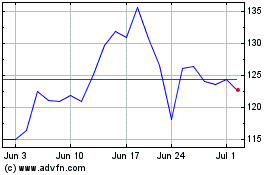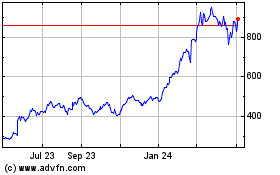By Amrith Ramkumar and Avantika Chilkoti
A punishing stretch for markets continued Wednesday, with
technology stocks leading major indexes lower yet again as worries
about global economic growth and corporate earnings continued to
spook investors.
The tech-heavy Nasdaq Composite slumped 2.3% and was on track to
close in correction territory, defined as a drop of 10% from a
recent peak. Semiconductor stocks dragged the technology sector
lower following weaker-than-expected sales targets from Texas
Instruments, and downbeat earnings from AT&T hurt
communications shares.
The S&P 500 slid 1.5% and is on pace for a sixth consecutive
decline and 13th drop in the past 15 sessions. The Dow Jones
Industrial Average fell 230 points, or 0.9%, to 24961 after opening
slightly higher. Like the S&P, the blue-chip index is more than
7% off its recent all-time high and has been recording
bigger-than-normal intraday swings.
Anxiety about weakness in the global economy and a slowdown in
corporate profitability have swung global stocks and commodities
lately. The declines in tandem across asset classes have raised
concerns that the worst could still be ahead for investors, who are
also grappling with the impact of higher interest rates.
"We just have a bunch of different uncertainties, and that
raises the fear factor all around," said Jerry Braakman, chief
investment officer of First American Trust.
Analysts have been weighing whether the recent selloff heralds
the end of a prolonged period of strength in the U.S. or is simply
a temporary adjustment.
While some investors expect another steady quarter of earnings
growth to help the market stabilize, others are worried about
pockets of weakness and that revenue gains might be peaking.
Downbeat sales targets from Texas Instruments dragged down
shares of companies that make computer chips, leading to declines
across the broader technology sector. Texas Instruments, Nvidia and
Advanced Micro Devices all fell at least 4%, and the S&P 500
information technology group dropped 2.1%.
Fast-growing internet and technology firms have been among the
hardest hit by the recent bout of market turbulence, with some
analysts wondering if their outsize sales increases can
continue.
AT&T was also an S&P 500 laggard, dropping 6% as the
telecommunications company continued to suffer losses of
traditional pay-TV customers. Shares of Netflix also tumbled,
declining 6.6%. The streaming company has erased the initial
advance last week that followed its latest earnings report.
In other sectors, United Parcel Service shares fell 3.8%
following a quarterly sales miss from the package-delivery
company.
Shares of aerospace giant Boeing rose 3.3%, helping the Dow
industrials after it said its business is booming, thanks to strong
demand for commercial jets and new defense projects. Still, the
S&P 500 industrials sector declined 1.8%, after it was battered
Tuesday following weak earnings from Caterpillar and 3M.
A number of companies are scheduled to post quarterly results
after the market closes Wednesday, including Microsoft, Ford, Visa
and Tesla.
Some executives have raised tighter financial conditions and
higher input costs as challenges moving forward, with the Federal
Reserve expected to continue to gradually boosting interest
rates.
On Wednesday, the yield on the benchmark 10-year U.S. Treasury
yield fell to 3.124%, according to Tradeweb, from 3.166%. Bond
yields fall as prices rise and have pulled back recently with some
investors seeking safety in Treasurys. The WSJ Dollar Index, which
tracks the dollar against a basket of 16 other currencies, added
0.3%.
President Trump blasted Fed Chairman Jerome Powell in an
interview with The Wall Street Journal Tuesday, saying the head of
the central bank threatened growth and appeared to enjoy raising
interest rates.
But tightening monetary policy alone doesn't explain the recent
market tremors, said Robin Creswell, managing principal at Payden
& Rygel, who pointed to geopolitical tensions as another source
of angst.
"What is complicating the picture is a range of extraneous
factors," Mr. Creswell said. "Those are much more difficult to
price, so in the short term the market will react more to those
short-term stimuli."
Investors are waiting to see if the U.S. and China can resolve
their monthslong tariff fight ahead of planned meetings between
leaders from the world's two largest economies next month.
Even if the two sides compromise, some analysts see challenges
to the global economy ahead.
Weakness in the housing and auto markets have unnerved investors
bracing for a pullback in the U.S., where growth has surged this
year. Sales of new homes in the U.S. fell for the fourth month in a
row in September, the Commerce Department said Wednesday.
Preliminary eurozone purchasing managers index data on Wednesday
suggested the regional economy grew at its slowest pace in over two
years in October. The figure dropped to 52.7 from 54.1 last month.
That is the lowest level since September 2016.
The Stoxx Europe 600 erased early gains Wednesday, closing down
0.2% in a sixth consecutive session of declines.
In Asia, Japan's Nikkei Stock Average rose 0.4%, while South
Korea's Kospi benchmark and Hong Kong's Hang Seng fell 0.4%.
Write to Amrith Ramkumar at amrith.ramkumar@wsj.com
(END) Dow Jones Newswires
October 24, 2018 14:14 ET (18:14 GMT)
Copyright (c) 2018 Dow Jones & Company, Inc.
NVIDIA (NASDAQ:NVDA)
Historical Stock Chart
From Mar 2024 to Apr 2024

NVIDIA (NASDAQ:NVDA)
Historical Stock Chart
From Apr 2023 to Apr 2024
